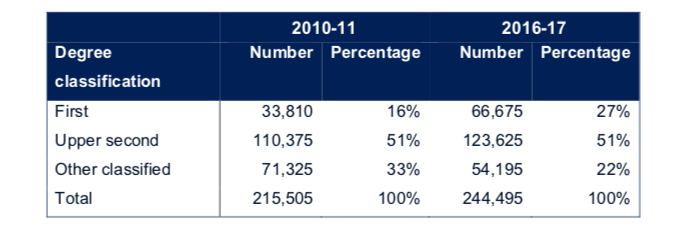Revealed: The university that gives first-class degrees to 50% of its students as regulator warns of grades inflation

A UK university gave half of its students a first-class degree last year, new figures have revealed.
The University of Surrey awarded firsts to 50% of its students in the year 2016-17, according to the Office for Students (OfS).
The OfS report looked at individual findings for 148 universities and other higher education providers in relation to first-class degree attainment.

It suggests that more than half of the providers (52%) show a statistically significant unexplained increase relative to both the sector and their own level in 2010-11.
A further 19% of providers showed a statistically significant unexplained level of attainment above that of the sector level in 2010-11, but no significant change relative to their own level in 2010-11.
Off the back of the figures, the regulator has now warned that spiralling grade inflation ‘risks undermining public confidence’ in the higher education system.
MORE: Elon Musk unveils ‘epic’ underground tunnel to combat ‘soul-destroying traffic’ across the world
MORE: Headless bodies of six baby seals discovered on popular New Zealand tourist spot
The OfS said universities must take urgent steps to tackle the issue after publishing data that suggests there has been a significant increase in the proportion of first and upper second class degrees being awarded in England.
According to the OfS, the percentage has increased from 67% in 2010-11 to 78% in 2016-17, while the percentage of first-class degrees has increased from 16% to 27%.
The analysis indicates the increases cannot be fully be explained by factors linked with graduate attainment.

Nicola Dandridge, OfS chief executive, said: ‘It is fundamentally important – for students, graduates and employers – that degrees hold their value over time.
‘This report shows starkly that there has been significant and unexplained grade inflation since 2010-11.
‘This spiralling grade inflation risks undermining public confidence in our higher education system.
‘We absolutely recognise how hard students work for their degrees, and accept that improved teaching and student support, and increases in the qualifications students gain before university, could explain some of the increase in grades.
‘However, even accounting for prior attainment and student demographics we still find significant unexplained grade inflation.’
Commenting on the results, Education Secretary Damian Hinds said: ‘I sincerely hope today’s figures act as a wake-up call to the sector – especially those universities which are now exposed as having significant unexplained increases.

‘Institutions should be accountable for maintaining the value of the degrees they award.
‘I am urging universities to tackle this serious issue and have asked the Office for Students to deal firmly with any institution found to be unreasonably inflating grades.’
Alistair Jarvis, chief executive of Universities UK, said: ‘Universities are already taking steps to tackle grade inflation.’

 Yahoo News
Yahoo News 
